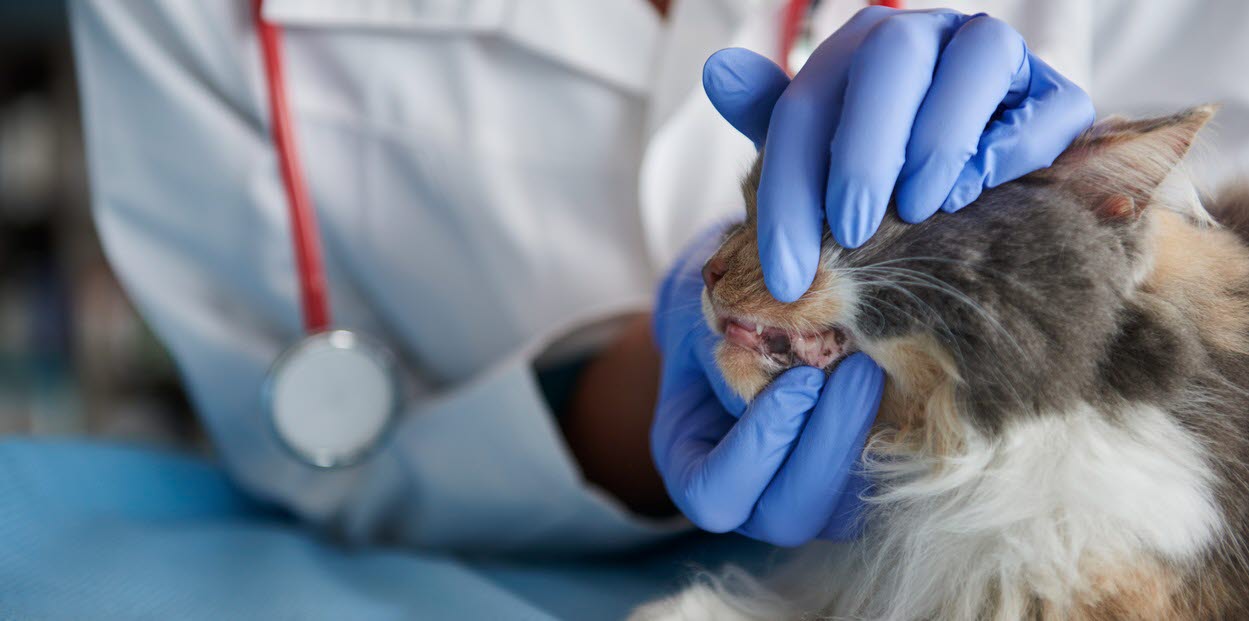Dental care for your pet

Four out of five dogs and cats over the age of three years have some form of dental disease. The level of dental disease will often progress and become more severe with age. This can become a real problem for your pet and is not only uncomfortable for them but can lead to more serious health concerns. Dental care is not only important for dogs and cats, but also smaller pets such as rabbits and guinea pigs. Our pets may not show signs that they’re suffering from dental issues and so it is often missed or forgotten about by owners, who are otherwise very proactive about their pet’s health.
Periodontal disease, which is a bacterial infection of the mouth, is easily preventable and is one of the most common problems that veterinarians diagnose in Australian pets. If it goes untreated, it will often lead to the requirement of severely affected teeth to be removed and can lead to other serious health problems such as infections in the kidneys, heart and liver.
In its early stages, it’s a disease that is reversible. However, it can often go undetected till it is quite severe as pets often won’t show signs of pain. Even pets with sore gums, an infected mouth or broken teeth will continue to eat. They need to eat to survive so may not go off their food until the pain in unbearable. This is definitely not something we won’t to put our pets through when it can be avoided.
Signs of periodontal disease to look out for include:
- bad breath
- tartar build up on teeth
- swollen, reddened or bleeding gums
- broken teeth
- reluctance to eat harder foods
- evidence of pus near the gums
If you notice any of these signs in your pet it is best to get into contact with your veterinarian and have them examine your pet’s teeth. Veterinarians will often score your pets periodontal disease based on the severity of the disease. The higher the grade, the more severe the disease is. With increasing severity of the disease, the more likely it is for your pet to require extractions of teeth and to suffer secondary health problems elsewhere in the body.
Veterinarians conducting an oral exam during your pet’s routine annual check-up can help identify any emerging dental health issues. To provide optimal health and quality of life for your pet, good oral care is vitally important. These annual checks are an ideal opportunity for you to find out if your pet has an existing problem that has gone unnoticed.
It is important to note, however, that when a pet opens its mouth, only some parts of the gum and teeth are visible. This makes some aspects of dental disease difficult to detect. Sometimes a veterinarian may recommend investigating your pet’s dental health further, which will require general anaesthesia and even dental x-rays. During this time, they will be able to remove any severely affected teeth and thoroughly clean and polish all others.
Rabbits and guinea pigs
Rabbits and guinea pigs face unique dental issues compared to dogs and cats as their teeth continually grow their entire lives. This allows them to slice and grind down tough fibrous material, such as grass, and is essential for their overall digestion. If the alignment of their teeth is slightly off or they are not fed a balanced diet high in fibre, it can lead to abnormal wear of the teeth which then become overgrown. This can be severely painful and lead to a number of health concerns, including death. Due to the anatomy of their mouths it is difficult to see their teeth, particularly the molars, so special equipment is required to examine their teeth thoroughly and it is not something that can be done at home.
The signs to look out for which may indicate a dental disorder in your rabbit or guinea pig include:
- Drooling or continual wet fur around the face or forelimbs
- Becoming pickier with food or eating less
- Reduced activity or altered behaviour
- Weight loss
- Swelling around the face
- Discharge from eyes
If you notice any of these signs a visit to your veterinarian who is equipped with the tools to examine your guinea pig and rabbits’ teeth is recommended. They will be able to assess the health of your pet’s teeth and discuss treatment options if required. Your veterinarian will also be able to discuss and provide information on an appropriate diet to feed to maximise dental health.
Just like we brush our teeth twice daily, preventative dental care is also important for all animals. Tooth brushing can be performed on our dogs and cats, is safer and more effective than chewing and many dogs and cats can be trained to enjoy having their teeth brushed, especially if started when they’re young. It is important to only use toothpaste and toothbrushes intended for pet use. Not all animals will be so co-operative to allow brushing, so diet, dental treats and for dogs, raw bones, can be used to help control dental disease. There are pros and cons of each method of preventative dental care and these can be discussed with your veterinarian.
